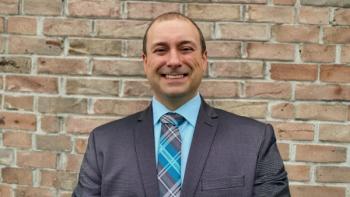
Addressing and Preventing Fraud in the Pharmacy
Drug Topics® sits down with George Euson, whose decades of experience in regulatory compliance for the pharmacy industry provide an insider's perspective on threats your business — and your patients — face today.
Drug Topics®: Hello and welcome to Over the Counter, a podcast from Drug Topics®. I'm your host Lauren Biscaldi, Managing Editor. In this episode, I chat with George Euson, Director of Compliance at Associated Pharmacies Incorporated, a subsidiary of American Associated Pharmacies. George has had a long career in the industry, focused on regulatory compliance and security. Today we're discussing the recent uptick in pharmacy fraud, as well as providing some tips and best practices that independent pharmacies can use to protect themselves and their customers. Hi, George, thank you so much for joining us today. I wanted to just kick off this interview with a quick introduction. So, I'm going turn it over to you.
George Euson: My name is George Euson, Director of Compliance for Associated Pharmacies Incorporated or API, which is a subsidiary of AAP. Basically, my job responsibilities are all compliance related with AAP, mostly related to controlled substances, suspicious order monitoring, due diligence on our pharmacy customers. I've been in the industry for over 20 years doing compliance-type duties after a career in law enforcement.
Drug Topics®: We're super glad that you were able to take the time to be with us today. When we discuss the recent uptick of fraudulent activity in the pharmacy industry, what kind of activities are we discussing? What kind of fraud is really on the rise right now?
Euson: We've seen a number of things and I don't know if it's because of COVID pandemic that we've been involved with, but there seems to have been an uptick in fraudulent activities across the board, and then also in the pharmacy and pharmaceutical industry. The reasons can be numerous, different staff shortages, staff training, added burden on pharmacists and pharmacies due to the vaccine rollout. As with anything when there's a shortage of time or maybe a shortage of attention to details, fraudulent activities can really take hold. We've seen a number of things from prescription fraud, phishing, there's always been an issue with staff. Theft issues if the pharmacist or the owner can't keep good attention on the details as far as inventory controls, checking in product as it comes in from the wholesaler, it leaves the opportunity there for theft and other criminal or diversion activities.
Drug Topics®: I just wanted to talk a little bit about avoiding falling victim to one of these phishing schemes. What should pharmacies and pharmacists do? Are there certain questions they should be asking themselves or protocols that they need to put in place?
Euson: The pharmacies when they're dealing especially with their wholesalers and manufacturers, but they're mainly dealing with their wholesalers. Most pharmacies have a primary wholesaler and then maybe secondary or tertiary wholesalers. There's usually standard protocol that they use for dealing with their wholesaler, purchasing product, the way that they may get notifications due to recalls, payment type issues. If there's anything that changes in those type of protocols or if they get emails or phone calls from people they're not familiar with, they really need to check that out because that is a way that the scammers will operate, phishing type emails having to do with products, having to do with recall products, having to do with their bank account or bank information. Basically, it's just being vigilant, being alert. If there's anything that seems out of the ordinary, if they're being rushed to make decisions, rushed to give information, something just doesn't feel right, it's kind of your gut check. Then they need to make calls, send emails, find out if this person, this information that they're getting is legitimate and check it out before they fall victim.
Drug Topics®:Great. I think that's really important advice. Better to ask a question and have the answer be than to get wrapped up in one of these schemes. Do you think that the COVID-19 pandemic can be implicated as the reason for the rise of this fraudulent activity across the industry? And if so, how did that happen?
Euson: I don't know if it's the reason. I think it could cause an increase. There's always been fraudulent activities in the pharmacy world. I just think that the opportunities due to the pandemic have exasperated that., Again, there's so much pressure on the pharmacies, especially with the rollout of vaccines. There were a number of pharmacies that have been closed. Staffing across every industry is hard these days. So, when you've got a lack of qualified workers in the pharmacy, it puts additional burdens on the pharmacies and the pharmacy owners and the pharmacists that work in the pharmacies, especially independent pharmacies when they're already at staffing minimums and now there’s added pressures to them. And I believe the people perpetrating the frauds take advantage of that.
Drug Topics®: It seems since the pandemic started that there's a lot of instances of price gouging and counterfeiting. I definitely remember seeing that reported on the news. So how can pharmacists and pharmacy owners stay abreast of these issues and really protect themselves?
Euson: One of the main things I believe is to make sure that they are dealing with a reputable wholesaler. Most pharmacies have a primary wholesaler or secondary wholesaler and I know they get bombarded with special deals and buying opportunities from different wholesalers and distributors, but they really need to deal with a reputable wholesaler. One that is VOD accredited, one that has a good reputation in the industry. They'll get bombarded too by other wholesalers who want to buy product from them, which means they can be a participant in a fraud without knowing it. A lot of the price going on was product that was in short supply, especially hospital product and a lot of this was being sourced by disreputable wholesalers through pharmacies. Giving them a great deal on product that they can buy or they sell at a great price. It's the old adage. “If it's too good to be true, it's too good to be true.” The main thing is buy from a reputable wholesaler and also demand that their product is sourced properly, sourced directly from the manufacturer. They get this information through their DSCSA information that they get from their wholesaler. They should check that. Demand that they're getting product that was only sourced directly through the manufacturer or an exclusive distributor for that manufacturer or someone that's an authorized distributor for that manufacturer because there's a lot of major manufacturers who only deal through authorized distributors and exclusive distributors. So, if you're getting a product that's being offered at a great price, there may be an issue. Again, “if it's too good to be true, it's too good to be true.”
Drug Topics®: It's funny that that saying also applies to pharmacy. I say that a lot in my life like “that sale just seems too good to be true.“ It's good to keep in mind for sure. Great. So, I'm going to shift gears just a little bit. There's been increases in other types of health care fraud, particularly around personal health information. It's actually one of the most lucrative pieces of data on the dark web and it can sell for as much as $1,000 per medical record, which is just wild to me, when you compare that to a credit card it's five bucks a credit card number. How can independent pharmacies protect themselves and their patient data from these types of breaches and having that patient information spread on the dark web?
Euson: You know pharmacies are privy to a lot of personal health information and it's their responsibility to safeguard that through the HIPAA laws and regulations. A lot of it is protecting that information through any type of phishing attempts that we just discussed, where someone may be looking for personal information. What's in their dispensing records and the type of information that they're providing many of the wholesalers in, and due to some recent litigation, there's going to be a lot more prevalence where the wholesalers are going to be looking at prescription data. They have to make sure that whoever is accessing that prescription data, that they have a business associate agreement with, which is key to protect the pharmacy. If that data would be breached, it's not on the pharmacy. It's on the third party that may have access that data. But make sure that they have a business associate agreement in place. They may want to have their own. They may want to have an attorney draw one up for them or at least review one that's given to them to sign to make sure it has all the provisions in HIPAA to protect them. Train their employees, that's huge. There's a lot of techs and they may not have that type of training and may not know the importance of protecting the personal health information of a patient. Just be educated on the HIPAA regulations, they do change. Make sure they're up to date and make sure that they have their staff trained on that information.
Drug Topics®: Great. I think that's a really important point, especially because there is so much staffing turnover because of the pandemic and the Great Resignation and all of that, so that's a really great point to keep in mind. You did touch on this a little bit in your last answer, but if we were going to kind of give our listeners top 3 to 5 kind of best practice tips that they could take away from this conversation on how to protect themselves from fraud. What would those tips be?
Euson: Just basically to remain vigilant, train their staff. Know that we live in a world where we only know our own 4 walls, but just know that there's bad people out there, doing bad things, and just be aware of that. It's kind of like being aware of your surroundings. Be aware of your business. Be aware of the people that are trying to attack your business. Conduct audits and inventories regularly, that's the way you're going to catch someone, either an employee or someone else that may be stealing from you. Especially in controlled substances and high dollar products, conduct audits, conduct inventories. Under law, they have to do inventories, but they're spaced out. Do them more regularly. Do them randomly. Have a separation of duties. Don't have one tech do everything for you. I’ve seen too often when one person has too much responsibility and the owner doesn't even know what's going on. They can be stealing from you, either money or product, having product go out the back door. Have a separation of duties. Audit those duties, audit those people. If you have new techs coming in, do background checks. They're not that expensive. Find out who these people are just to make sure that they have all the certifications that they say they did. Don't be trusting. It's again the old adage ‘trust but verify’.
Drug Topics®: Awesome. Well, this was a super informative conversation. I know I learned a lot so I'm sure that our listeners are going to take a lot of this away and be able to implement it in their own pharmacies. I just wanted to thank you again, George, for joining us today. I appreciate you taking the time. Thank you.
Newsletter
Pharmacy practice is always changing. Stay ahead of the curve with the Drug Topics newsletter and get the latest drug information, industry trends, and patient care tips.





















